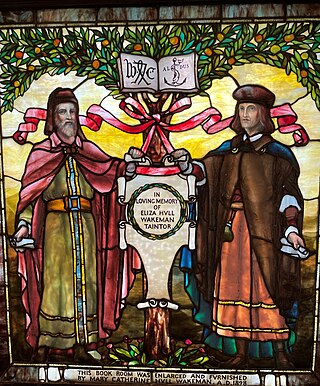Aldus Manutius | |
|---|---|
 Manutius, illustration in Vita di Aldo Pio Manuzio (1759) | |
| Born | Aldo Manuzio c. 1449/1452 |
| Died | 6 February 1515 |
| Other names | Aldus Manutius the Elder |
| Occupation(s) | Renaissance humanist, printer, publisher |
| Known for | Founding the Aldine Press at Venice Founding the New Academy |
Aldus Pius Manutius (/məˈnjuːʃiəs/; Italian: Aldo Pio Manuzio; c. 1449/1452 – 6 February 1515) was an Italian printer and humanist who founded the Aldine Press. Manutius devoted the later part of his life to publishing and disseminating rare texts. His interest in and preservation of Greek manuscripts mark him as an innovative publisher of his age dedicated to the editions he produced. Aldus Manutius introduced the small portable book format with his enchiridia, which revolutionized personal reading and are the predecessor of the modern paperback book. He also helped to standardize use of punctuation including the comma and the semicolon.[1]
Manutius wanted to produce Greek texts for his readers because he believed that works by Aristotle or Aristophanes in their original Greek form were pure and unadulterated by translation. Before Manutius, publishers rarely printed volumes in Greek, mainly due to the complexity of providing a standardized Greek typeface. Manutius published rare manuscripts in their original Greek and Latin forms. He commissioned the creation of typefaces in Greek and Latin resembling the humanist handwriting of his time; typefaces that are the first known precursor of italic type. As the Aldine Press grew in popularity, Manutius's innovations were quickly copied across Italy despite his efforts to prevent the piracy of Aldine editions.
Because of the Aldine Press's growing reputation for meticulous, accurate publications, Dutch philosopher Erasmus sought out Manutius to publish his translations of Iphigenia in Aulis.
In his youth, Manutius studied in Rome to become a humanist scholar. He was friends with Giovanni Pico and tutored Pico's nephews, the lords of Carpi, Alberto and Leonello Pio. While a tutor, Manutius published two works for his pupils and their mother. In his late thirties or early forties, Manutius settled in Venice to become a print publisher. He met Andrea Torresano in Venice and the two co-founded the Aldine Press.
Manutius is also known as "Aldus Manutius the Elder" to distinguish him from his grandson, Aldus Manutius the Younger.

- ^ Magazine, Smithsonian; Nadeau, Barbie Latza. "The Man Who Changed Reading Forever". Smithsonian Magazine. Retrieved 19 November 2023.